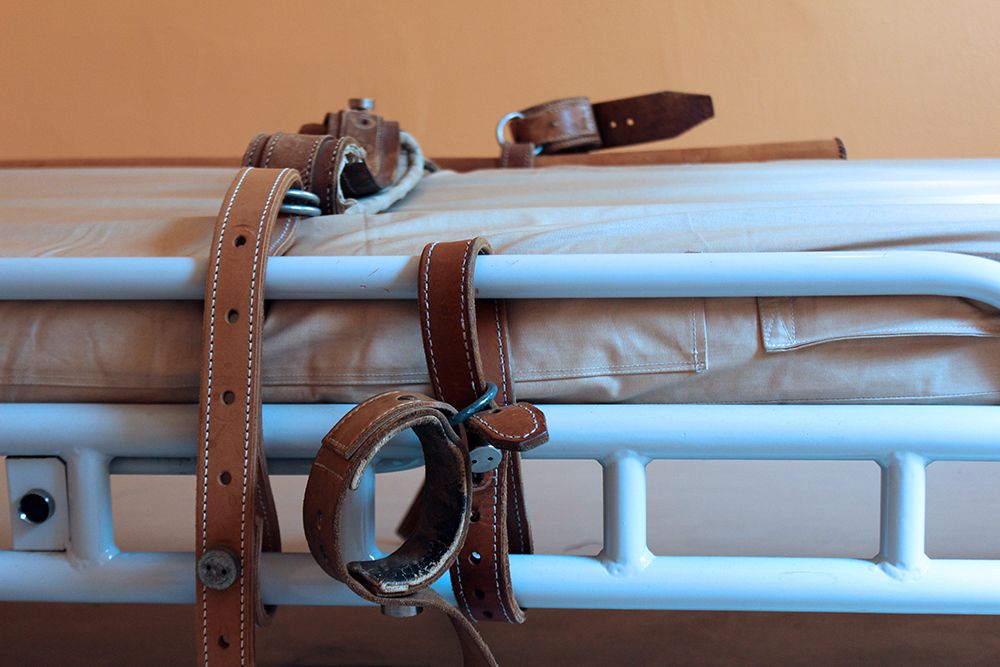As the nation observes Black History Month, the Citizens Commission on Human Rights highlights racial disparities in restraint-related deaths and advocates for legislative change to protect vulnerable patients.
LOS ANGELES - Feb. 10, 2025 - PRLog -- The Citizens Commission on Human Rights (CCHR) International commends the introduction of a new bill in Hawaii that prohibits the use of life-threatening restraints and seclusion in psychiatric hospitals, particularly for minors and vulnerable adults. This bill, introduced by Representative Elijah Pierick, sets a vital precedent for other U.S. states to follow, aiming to protect patients from traumatic and often lethal restraint practices.[1]
CCHR underscores the importance of this legislation during Black History Month, spotlighting the alarming over-representation of racial minorities among those subjected to restraints and seclusion in the mental health system. The bill only permits the use of restraint in rare instances where there is an immediate risk of harm to the patient or others, and only after less intrusive measures have been attempted.
A 2011 report found that African Americans were disproportionately affected by restraint-related deaths, making up 22% of the studied deaths while only comprising 13% of the U.S. population. In addition, Black and multiracial patients are more likely to experience restraints, often for longer periods, than their white peers.[2] In 2021, a study of adults receiving an emergency psychiatric evaluation between January 1, 2014, and September 18, 2020, at a large academic medical center revealed Black patients continued to be at higher risk of experiencing physical or chemical restraint compared with White patients.[3]
Responding to high numbers of restraint deaths, in 2020, CCHR formed its Task Force Against Racism and Modern-Day Eugenics, led by Reverend Frederick Shaw, aimed at ending physical and chemical restraint deaths, particularly prevalent among minority communities.
This followed the death of a 16-year-old African American boy after being restrained in the now-closed residential behavioral facility for teens in Michigan. The Kalamazoo County Medical Examiner's office determined the death was a homicide and three staff were charged with involuntary manslaughter and second-degree child abuse—all pleading guilty.[4]
Two years later, another shocking tragedy was the death of a 7-year-old foster care child who was restrained and killed at a psychiatric residential center in Louisville, Kentucky on July 17, 2022. In September, the medical examiner also ruled that death a homicide.[5]
Their deaths underscored the urgent need for legislative action because, despite the clear risks, the practice of using seclusion and mechanical restraints remains common in psychiatric facilities. A 2023 report from Psychiatric Services issued a call for regulatory action to end these practices due to the significant trauma and potential for lethal outcomes, including asphyxiation and cardiac events.[6] This call is answered by Rep. Pierick's proposed bill, which aims to curb restraint use by implementing stronger safeguards and making these methods a last resort.
Studies such as the one about the Pennsylvania State Hospital System, which successfully eliminated the use of restraints and seclusion across multiple hospitals between 2011 and 2020, show that it is possible to improve patient safety while phasing out these harmful practices. The 2022 study of experience, published in Psychiatry Online, examined the effect of this change on key safety measures: physical restraint, assaults, aggression, and self-injurious behavior. It found key safety metrics improved, including a significant reduction in restraint duration and incidents of physical restraint.[7]
Global Momentum Against Restraint Practices
CCHR supports a nationwide movement to eliminate physical and chemical restraints, advocating for the passage of similar legislation in all states.
Globally, the call to end restraint practices is growing. In October 2023, the World Health Organization and the United Nations Office of the High Commissioner for Human Rights issued guidance emphasizing the severe harm caused by coercive psychiatric practices, including restraints.[8] These organizations join CCHR in advocating for an absolute ban on all coercive measures, including restraint and forced detention in mental hospitals.
CCHR is committed to seeing Rep. Pierick's bill become law in Hawaii and to replicate similar legislative efforts across the U.S. to protect vulnerable patients.
The group, which was established in 1969 by the Church of Scientology and eminent professor of psychiatry Dr. Thomas Szasz, was one of the groups that were instrumental in obtaining federal regulatory reforms regarding restraints. However, CCHR International's President, Jan Eastgate, says a greater unified movement is still needed to prevent further deaths and trauma within the psychiatric system.
Sources:
[1] trackbill.com/bill/hawaii-house-bill-1394-restraint-seclusion-minors-vulnerable-adults-hospitals-medical-facilities/2638204/
[2] www.cchrint.org/2022/06/29/us-could-learn-from-reform-of-coercive-mental-health-practices/; "National Review of Restraint Related Deaths of Children and Adults with Disabilities: The Lethal Consequences of Restraint," Equip for Equality, 2011, www.equipforequality.org/wp-content/uploads/2024/11/National-Review-of-Restraint-Related-Deaths-of-Adults-and-Children-with-Disabilities-The-Lethal-Consequences-of-Restraint.pdf; "Race-Based Disparities in the Frequency and Duration of Restraint Use in a Psychiatric Inpatient Setting," Psychiatric Services, 1 Apr. 2024, pubmed.ncbi.nlm.nih.gov/37855100/
[3] Colin M. Smith, et al., "Association of Black Race With Physical and Chemical Restraint Use Among Patients Undergoing Emergency Psychiatric Evaluation," Psychiatry Online, 21 Dec. 2021, psychiatryonline.org/doi/10.1176/appi.ps.202100474
[4] www.cchrint.org/2024/05/31/journal-urges-its-time-to-regulate-troubled-teen-behavioral-programs/
[5] Deborah Yetter, "7-year-old died at Kentucky youth treatment center due to suffocation, autopsy finds; 2 workers fired," Louisville Courier-Journal, 19 Sept. 2022, www.usatoday.com/story/news/nation/2022/09/19/death-child-jaceon-terry-brooklawn-kentucky-youth-center/10428004002/
[6] "Toward the Cessation of Seclusion and Mechanical Restraint Use in Psychiatric Hospitals: A Call for Regulatory Action," Psychiatric Services, Jan. 2024,
psychiatryonline.org/doi/10.1176/appi.ps.202100538
[7] Gregory M. Smith, "Effects of Ending the Use of Seclusion and Mechanical Restraint in the Pennsylvania State Hospital System, 2011–2020," Psychiatry Online, 20 July 2022, psychiatryonline.org/doi/10.1176/appi.ps.202200004
[8] "Mental health, human rights and legislation," World Health Organization and United Nations, www.who.int/publications/b/70051
Photos: (Click photo to enlarge)

Source: Citizens Commission on Human Rights
Read Full Story - Hawaii Bill Marks Progress in Protecting Patients From Dangerous Restraint Practices | More news from this source
Press release distribution by PRLog





